Phillippines Bans Binance. Now What?
Binance has been given three months by the SEC "to give Filipino investors who have holdings in Binance to close their positions and take out their investments."
 Brian
Brian
Author: Dai Xinsheng; Source: Airdrop Reference
The current price of Bitcoin fluctuates around 84,000, which is very dull and boring. If you have already invested according to the DCA method introduced inthis article, then the price should not be the most important issue for you. On the contrary, we need to constantly improve our cognition and strengthen our beliefs so that we can hold Bitcoin more steadily and for a longer time.
Reading is undoubtedly the fastest way to achieve self-improvement. Starting today, let's read a book together, "The Bitcoin Standard", the traditional Chinese translation is "Bitcoin Standard" and the simplified Chinese translation is "The Future of Money".
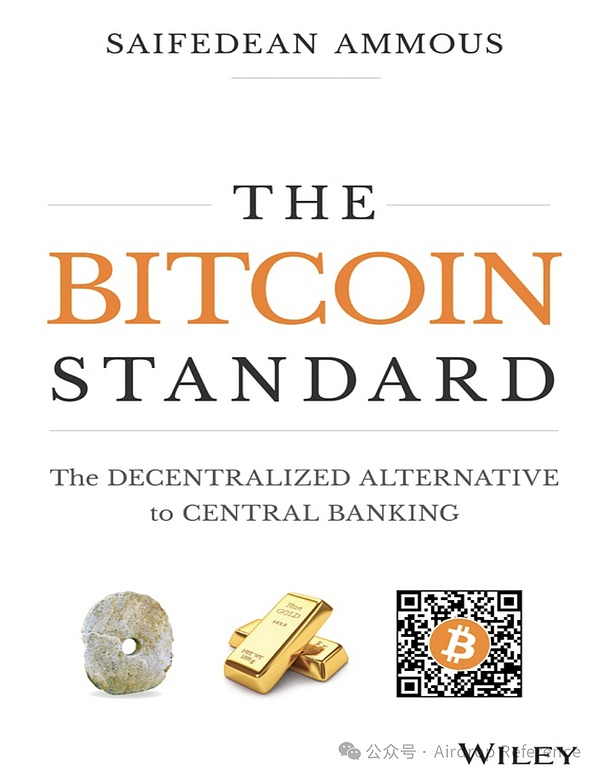
I prefer the name "Bitcoin Standard" because it can quickly contrast with the historical Gold Standard and help us understand the core value of Bitcoin. Compared with concepts such as "standard" or "future", "Bitcoin Standard" can better highlight the potential of Bitcoin as the cornerstone of the new global monetary system.
After the publication of The Bitcoin Standard in 2018, it quickly became one of the most popular books on Bitcoin economics in the world, and was translated into 38 languages, influencing countless investors, scholars, entrepreneurs, and even government decision makers.
Today, The Bitcoin Standardhas become a must-read classic for the global Bitcoin community.
The profound impact of this book is reflected in:
it makes companies and institutions begin to consider Bitcoin as a long-term reserve asset ;
it makes governments realize that Bitcoin has the potential to become the global reserve currency of the future
it allows individual investors to build faith and hold on to it for the long term amid short-term fluctuations
it promotes
it leaf="">Bitcoin Economicshas become a real academic research field.
Let's talk about them one by one.
After the publication of "Bitcoin Standard", more and moreinstitutional investors began to seriously consider the long-term value of Bitcoin. The most famous case is Strategy CEO Michael Saylor, who, after reading the book, had a deep resonance with the monetary properties of Bitcoin.
In 2020, Saylor decided to let Strategy purchase Bitcoin as a reserve asset. To date, the company has become the world's largest listed company Bitcoin holder, currently holding 499,000 BTC, see the figure below;
Seller not only actively promotes the "Bitcoin-based" company strategy himself, but also encourages other companies and institutions to allocate Bitcoin.
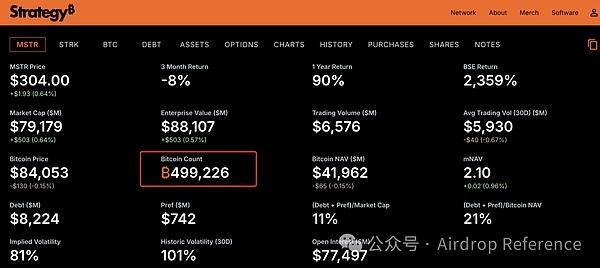
He has publicly stated many times that "Bitcoin Standard" is the key reading for him to establish his belief in Bitcoin investment, and recommends it to all entrepreneurs and investors interested in Bitcoin. I have conducted an in-depth analysis of Saylor's transformation in "Bitcoin Dividends".
Seller's actions not only made Strategy the listed company with the largest Bitcoin holdings, but also triggered a trend of institutional investment in Bitcoin. Companies including Tesla and Square (Block) have begun to include Bitcoin in their balance sheets.
The theory of "Bitcoin Standard" not only affects corporate strategies, but also has a substantial impact on national policies.
In 2021, El Salvador became the first country in the world to adopt Bitcoin as its legal tender. The government referred to the views of "Bitcoin Standard" in the decision-making process and invited Amous to serve as an economic adviser to provide policy recommendations for the national application of Bitcoin.
El Salvador's President Nayib Bukeleadopted Bitcoin as the national currency,promoting the global process of de-dollarization;
the country launchedBitcoin Bonds (Volcano Bonds)and the national Bitcoin walletChivo, trying to incorporate Bitcoin into the national fiscal system.
El Salvador's decision has attracted global attention, and some developing countries have begun to think about the feasibility of Bitcoin as legal tender. Although the policy still faces challenges, it has set a historic precedent - Bitcoin is not just an investment asset, it is becoming a national financial tool.
"The Bitcoin Standard" has not only influenced companies and governments, but has alsobecome an important topic in global economics and policy discussions.
U.S. Congressman Warren Davidson praised the book as "one of the best books in recent memory" and cited its views many times in congressional policy discussions;
many traditional economists began to re-examine the economic significance of Bitcoin, and the Austrian School's free market economic theory has therefore received more attention;
the theoretical framework of the book has been adopted by
multiple Bitcoin education courses, making it a standard reading in universities, research institutions and online education platforms.
This influence is not limited to the cryptocurrency circle, but extends to the broader financial, policy and academic fields, making Bitcoin economics a formal research field.
The value of Bitcoin is not only brought by technology, but is built on global consensus. "Bitcoin Standard" provides theoretical weaponsto help Bitcoin holders strengthen their beliefs and understand why Bitcoin is not a bubble, but a monetary revolution.
This book not only makes the discussion of the Bitcoin community more rigorous and profound, but also makes people realize that the value of Bitcoin far exceeds the rise and fall of prices - it is a shield against inflation, a fortress against the excessive issuance of legal currency, and the ultimate tool for realizing personal sovereign wealth.
In addition, it has also contributed to the production of a large number of Bitcoin educational content. A large number of discussions based on "Bitcoin Standard" have appeared on YouTube, podcasts, and social media, making the idea of Bitcoin more widely spread.
After the huge success of "Bitcoin Standard", Amus continued to explore the economic logic of Bitcoin and published more related works, such as:
The Fiat Standard (2021)-Systematically analyzes the drawbacks of the legal currency system, reveals how it systematically deprives personal wealth, and compares the superiority of Bitcoin;
Principles of Economics (2019) Economics, 2022) - Reconstructing the economics education system from the perspective of the Austrian School and challenging Keynesian economics. These subsequent studies further consolidated Amus's economic theory and made Bitcoin economics an independent academic field, attracting the attention of more and more scholars. The huge impact of "Bitcoin Standard" also makes it a book with a pivotal position in the history of Bitcoin. 2. How high is the historical status of "Bitcoin Standard"?
The history of Bitcoin is not only the history of rising prices, but also the history of the continuous building of consensus. In other words, without the building of consensus, the price of Bitcoin would not have risen so fast. In this process, three books played a decisive role, and "Bitcoin Standard" is one of them. The other two are:
Digital Gold, 2011 ;
Mastering Bitcoin, 2015
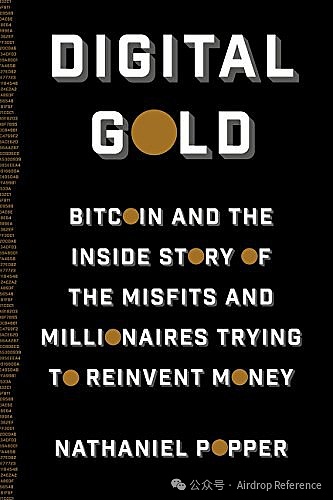
Digital Gold, published in 2011, is the first book in the history of Bitcoin to record its early development in detail. It was written by Nathaniel Popper, a reporter for The New York Times. The book tells the story of Bitcoin's journey from the release of the white paper by Satoshi Nakamoto to its gradual move toward the mainstream in 2014 in a narrative style.
The core value of this book is that it isa book about people. It vividly depicts the earliest believers of Bitcoin, including supporters of the cypherpunk movement, geek hackers, libertarians, Wall Street traders, and even early users of the gray market such as "Silk Road". The book details how Satoshi Nakamoto anonymously released the Bitcoin protocol, the stories of Lars Ulbricht (founder of Silk Road), the Winklevoss brothers (the first Bitcoin billionaires), Charlie Shrem (founder of BitInstant), etc., allowing you to understand the rise of Bitcoin from a human perspective.
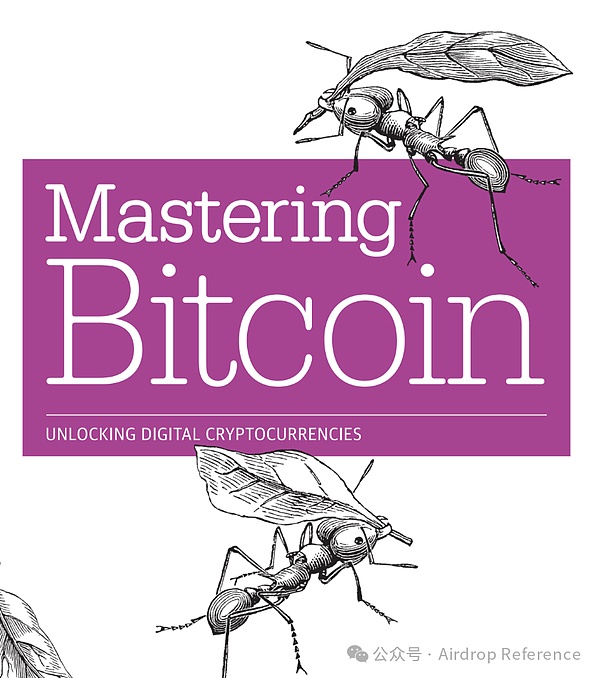
In 2015, Mastering Bitcoinwas written by Andreas Antonopoulosand is hailed asThe "Bible" of Bitcoin technology has helped countless developers and Bitcoin enthusiasts truly understand the underlying principles of this technology.
If "Digital Gold" tells the story and history of Bitcoin, then "Mastering Bitcoin" is a technical guide. The biggest advantage of this book is that it is easy to understand. It analyzes the working principle of Bitcoin, including public key encryption, blockchain data structure, transaction scripts, mining mechanism, and how to build your own Bitcoin application. The author uses clear language, code examples and case analysis to show us the technical charm of Bitcoin.
The significance of this book is that it makes Bitcoin not just a financial concept, but an open technical protocolthat anyone can learn, develop, and improve. It can be said that "Mastering Bitcoin" has cultivated generations of developers for the Bitcoin ecosystem, making Bitcoin not just a speculative asset, but a truly decentralized financial network.
This book is also my introduction to blockchain. I started buying Bitcoin after reading this book. If you are also hesitant, you might as well take a look at this book. I have also written an articleto recommend this book. 2.3 Why is Bitcoin Standard more historically significant? If Digital Gold records the origin and initial consensus of Bitcoin, and Mastering Bitcoin lays the technical foundation for Bitcoin, then Bitcoin Standard is the first book to truly place Bitcoin in the framework of economics, viewing it as a sound currency rather than just an innovative technology. Bitcoin Standard tells us that Bitcoin is not just an investment target, it is the "gold" of the digital age and the cornerstone of the future global monetary system. It not only explains why Bitcoin has monetary properties, but also demonstrates why Bitcoin is more powerful than gold, why the central bank system is collapsing, and why the world is transitioning to the Bitcoin standard.
These three books construct the knowledge system of Bitcoin from three different perspectives: history, technology, and economy. The Bitcoin Standard is undoubtedly the most important ideological work in this financial revolution.
The reason why "Bitcoin Standard" has such a great impact is not because it simply describes the technical architecture, price trend or investment strategy of Bitcoin, but becauseAmus adopted a rigorous economic methodology to place the rise of Bitcoin in the evolutionary framework of the entire monetary history. The most important value of this book is not to provide short-term market forecasts, but to provide aunderstanding of the underlying logic of monetary evolution, so that you and I can see through short-term price fluctuations and see the historical inevitability of Bitcoin becoming a global reserve asset.
Amus' core methodology mainly includes the following dimensions:
Amus does not discuss Bitcoin in isolation, but reveals the historical logic of Bitcoin's rise by reviewing the evolution of currency. He believes that currency is not invented out of thin air by the government or individuals, but is the result of natural selection in human society in long-term market interaction. This theory is based on the concept of "spontaneous order" in economics, that is, the evolution of currency is not a product of planned economy, but a gradual evolution of the market in the process of optimizing transaction efficiency.
His method of argument is similar to Darwin's theory of evolution:
The evolution of currency is similar to biological evolution. Different forms of currency (such as shells, salt, gold, and legal tender) have competed throughout history, and the one that survives is the most advantageous currency.
The key factors affecting the outcome of currency competition are scarcity, verifiability, convenience and stability.
leaf="">Every large-scale economic change in human society is accompanied by the rise of new forms of currency, such as the agricultural revolution brought metal currency, the industrial revolution gave birth to legal tender, and the information revolution is giving birth to Bitcoin.
In this framework, Bitcoin is not a speculative tool, but the next stage of currency evolution, just as gold replaced shells and the US dollar replaced gold, it will eventually replace the unstable legal tender system.
Amus did not simply say “Bitcoin is better than legal currency”, but based on the law of survival of the fittest in currency competition, he used economic principles to deduce the competitive advantage of Bitcoin. He used several classic economic concepts, such as:
"Sound Money" theory: A stable currency must have low inflation, high credibility and long-term value storage capabilities, which Bitcoin has but legal tender does not;
"Time Preference" theory: Bitcoin is a low-time preference currency that encourages savings, while legal tender stimulates consumption through inflation, undermining people's long-term economic planning;
"Network Effect" leaf="">: The value of a currency comes from the scale of its users. Bitcoin is entering the acceleration stage of network effects and becoming a global storage tool.
His argument is similar to natural selection: Currency does not survive by government coercion, but by market selection. Fiat currency has led to a crisis of trust due to excessive issuance, and gold has insufficient liquidity due to its physical properties. Bitcoin just makes up for the shortcomings of these two, so it will inevitably become the dominant currency in the future.
Amus's discussion is not just based on theoretical deduction. In his book, he widely usesmathematical models and data analysisto quantify the economic attributes of Bitcoin. His research method is similar to that of financial analysts studying traditional assets,using data to verify assumptions rather than making assumptions.
The core tools he uses include:
Stock-to-Flow (S2F) Model: Use mathematical models to explain why Bitcoin is more scarce than gold and predict its long-term value growth trend;
Federal Reserve Money Supply Growth Rate vs. Bitcoin Supply Growth Rate Comparison: Use data to prove how Bitcoin's fixed supply resists inflation, and how the unlimited printing of fiat currency erodes purchasing power;
Bitcoin Price History vs. Major Economic Events: Use data to compare Bitcoin in Its performance during the 2008 financial crisis and the massive money printing during the 2020 pandemic illustrates how it has become a global safe-haven asset.
The significance of this methodology is that it makes the value of Bitcoin no longer dependent on faith, but is based on a quantifiable and verifiable economic model, making Bitcoin a "mathematically supported monetary experiment" rather than a hype concept.
In addition to economic analysis, Amus also explored how Bitcoin affects the global financial landscape from the perspective of political economy. His way of argument is similar to that of the realist school of international relations, namely:
Currency is a manifestation of power, the fiat currency system is a means for the government to control the economy, and Bitcoin weakens the government's monopoly on currency;
The core of the US dollar hegemony lies in the dollar standard, and Bitcoin is challenging this system, and El Salvador's listing of Bitcoin as legal tender is an important step in global de-dollarization;
Bitcoin promotes economic freedombecause it allows individuals to transcend government capital controls and directly hold and transfer wealth without being restricted by the banking system.
This analytical method makes Bitcoin not just a technical or investment phenomenon, but a catalyst for change in the global financial order.
Amous not only discusses the technical and economic attributes of Bitcoin, he also explores howhuman psychologyaffects the choice of monetary system. He used the method of behavioral economics to explain why Bitcoin is undervalued in the short term but has extremely high market appeal in the long term: Loss Aversion: People’s pain of losing wealth is far greater than the happiness of gaining wealth, and Bitcoin provides a way to avoid the risk of legal currency depreciation; Herding Effect: When institutions begin to enter the Bitcoin market (such as Strategy, Tesla, and Bitcoin ETF), more and more individuals and companies will follow; Incremental Consensus: Consensus: Bitcoin adoption is an ever-increasing process, and as more and more countries, institutions, and individuals use it, its value will continue to rise. Through these psychological models, he explains why Bitcoin may experience sharp fluctuations in the short term, but in the long run, its value trend is irreversible.
Amus did not simply tell you that "Bitcoin will rise", he used a whole set of analysis frameworks of history, economics, data models, political economy and psychologyto construct a complete Bitcoin understanding system.
This makes "The Bitcoin Standard" not just a book about Bitcoin, but a book about the nature of currency, the global financial order and the laws of human economic evolution.
If you finish reading this book, you will not only remember the price of Bitcoin, but will have a deeper understanding of the nature of currency, the operating logic of the economic system, and how Bitcoin can change the world. This is the real uniqueness of this book.
Saifedean Ammous was born in Nablus, Palestine in 1980. He spent his childhood in Saudi Arabia and Brazil until he moved to Ramallah in the West Bank in 1990. Growing up in such a turbulent region, he witnessed early on the impact of currency devaluation, political conflicts and capital controls on the lives of ordinary people.
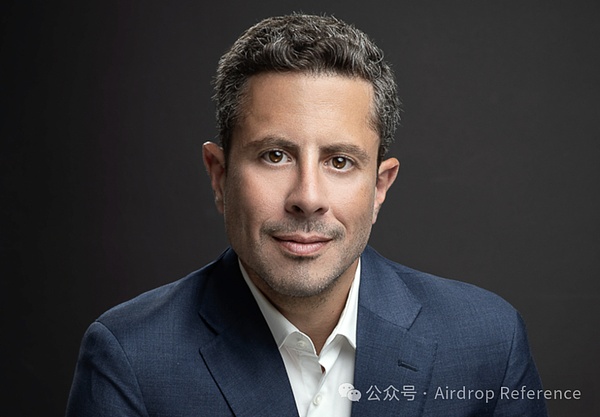
However, Amus' academic starting point had nothing to do with economics. He studied mechanical engineering at the American University of Beirut, but switched to social sciences after graduation, studying for a master's degree in development management at the London School of Economics and Political Science (LSE). He then obtained a PhD in sustainable development at Columbia University, with research interests in energy economics, resource management, and the stability of monetary systems.
This academic background laid the foundation for his interdisciplinary analytical ability, so that he did not rely solely on traditional economic theories when studying currency, but combined the rigor of engineering, the mathematical modeling of energy economics, and the deep insight of development economics into the real world.
After graduating with a doctorate, Amous entered the Lebanese American University as an assistant professor of economics, teaching courses such as capital markets, development economics, and energy economics. His research direction initially focused on resource economics, especially oil, energy supply chain, and global economic growth model.
But as time went on, he began to question the sustainability of the central bank system and fiat money. In his teaching and research, he gradually discovered that:
the inflation mechanism of the fiat currency system causes wealth to be continuously redistributed to the government and financial institutions that have the "right to print money"
the central bank's monetary policy is unpredictable. The government can issue currency indiscriminately at any time, while ordinary people can only passively bear the consequences of shrinking assets
;
although gold is scarce, in the modern economic system, it is still subject to government supervision and market manipulation and cannot truly become the hard currency of the free market.
During this process, he came into contact with Austrian Economics, especially the theories of Ludwig von Mises and Friedrich Hayek, and began to pay attention to the concept of Sound Money.
What really changed his cognition was his in-depth study of the economic logic of Bitcoin around 2013. He found that:
Bitcoin is the first completely decentralized, immutable, mathematically guaranteed scarce currency in human history;
Bitcoin's issuance mechanism (block reward halving) gives it better inflation control capabilities than gold;
Bitcoin does not rely on the government or central bank, its value is entirely determined by market consensus.
This prompted him to graduallyabandon the mainstream Keynesian economics system, turn to the Austrian school, and become one of the most determined disseminators of Bitcoin's ideas.
From El Salvador incorporating Bitcoin into national policy to Strategy (formerly MicroStrategy) practicing "Bitcoin standard" with tens of billions of dollars in holdings, this series of events is not accidental, but an early signal of the change in the global monetary system.
Bitcoin standard is not a short-term strategy, but a long-term paradigm.
In the past, gold was the world's reserve currency, but it could not adapt to the global liquidity needs of the digital age; legal tender was the cornerstone of the credit system, but it gradually lost its credibility in the unlimited expansion of the money printing mechanism. Bitcoin, with its
fixed supply, anti-inflation, and decentralization, has become the most powerful candidate for "sound money" in this era.
Where national policy and capital resonate, historical turning points are often born.
When a sovereign state incorporates Bitcoin into legal tender, it is fighting against global monetary hegemony; when a listed company uses Bitcoin as the core of its balance sheet, it is fighting against liquidity dilution. When capital and sovereignty point to Bitcoin at the same time, we are witnessing the formation of a new monetary consensus.
The return of "sound money" is not a one-day thing, but a generational change. The winners of this change are not short-term speculators, but those who can truly understand the logic of Bitcoin standard and are willing to stick to it for a long time.
Binance has been given three months by the SEC "to give Filipino investors who have holdings in Binance to close their positions and take out their investments."
 Brian
BrianDeepMind's AI predicts structures for two million materials, revolutionising discovery and applications in batteries, solar panels, and computer chips.
 Hui Xin
Hui XinSequence Builder is built to address a particular pain point - eliminating the need for developers to make trade-offs between integrating web3 elements and focusing on game design.
 Davin
DavinBinance innovates with the world's first triparty crypto arrangement, enhancing security for institutional investors while also transitioning away from its BUSD stablecoin.
 YouQuan
YouQuanChainlink experiences a record spike in whale transactions, signaling positive momentum ahead of its Staking v0.2 update.
 YouQuan
YouQuanCasio Computer Co., Ltd. has revealed plans to release 2,000 limited edition VIRTUAL G-SHOCK NFTs (non-fungible tokens) on 15 December, showcasing futuristic shock-resistant watches in a virtual realm. The move follows the September 2023 launch of the VIRTUAL G-SHOCK project aimed at engaging with Gen Z and new users in a virtual space.
 Joy
JoyAmid SEC challenges and cryptocurrency disputes, Coinbase CEO Brian Armstrong calls for a stronger U.S. regulatory framework.
 Hui Xin
Hui XinNexo partners with Koinly to simplify crypto tax reporting for users, offering tailored tax forms and integrating with over 100 jurisdictions.
 YouQuan
YouQuanBinance has announced a new campaign called "Crypto is better with Binance". The campaign will feature ten stories from Binance users around the world who have used crypto to improve their lives.
 Joy
JoyCircle staunchly denies allegations of illicit financing and ties to Justin Sun, countering claims by the Campaign for Accountability amid broader cryptocurrency concerns.
 Hui Xin
Hui Xin